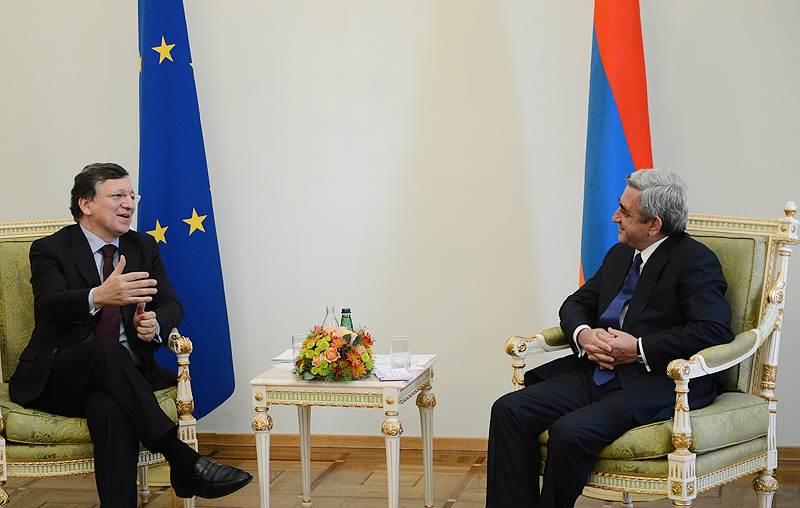EU and Armenia seek conclusion of Deep and Comprehensive Free Trade agreement in 1 year

Likewise, European Commission President Barroso stated in an interview ahead of his very first trip to Yerevan for the EPP Eastern Partnership summit today, that “EU-Armenia relations further intensified in 2012. Good progress was made in the negotiations on an Association Agreement, which will provide for Armenia’s political association and economic integration with the EU. In that framework, since the start in July, 3 negotiating rounds have taken place on a future Deep and Comprehensive Free Trade Area. This agreement has the potential to increase Armenian exports to the EU by 30%. By the time of the Vilnius Eastern Partnership Summit in November 2013, we hope to be near to the completion of both sets of negotiations.”*
“For Armenia, this development means the chance to create a more efficient administration, a more dynamic market with growth chances for everyone, and European standards, including in the field of democracy and Human Rights”, comments EuFoA Secretary General, Michael Kambeck. “Given the geopolitical situation with closed borders to the east and west, the DCFTA allows Armenia to grow from the inside. We hope that the Presidential Elections in February will mark the beginning of this change concretely and that then the government will focus on the implementation in parallel with the negotiations. Armenia needs this and has no time to lose.”
The PCC conclusions are generally an interesting read, summarising all sorts of aspects of the current EU-Armenia relations.
As for the regional stability and security issues, the PCC conclusions reiterate the need for a peaceful solution of the Nagorno-Karabakh conflict in the framework of the OSCE Minsk Group Basic Principles, “stresses the importance of reaching an agreement on Basic Principles for settlement of the Nagorno-Karabakh conflict as an important step towards a comprehensive peace agreement to ensure lasting and sustainable peace; further stresses the importance of creating suitable conditions for a future legally-binding free expression of will concerning a final status solution”, paragraph 17.
On the fragile situation on the line of contact (LoC), “underlines the value of confidence-building measures, including withdrawal of snipers from the line of contact, in accordance with the OSCE recommendations”, paragraph 18.
Moreover, the document highlights the EU-Armenian common ground on the planned opening of an airport in Nagorno-Karabakh, “welcomes all statements contributing to the peaceful settlement of the conflict and reminds that regarding the planned opening of an airport in Nagorno-Karabakh, the OSCE Minsk Group Co-Chairs have received renewed assurances from all sides that, in accordance with international law, they reject any threat or use of force against civil aircraft and will refrain from politicizing the issue”, paragraph 23.
As for the normalisation of Armenian-Turkish relations, the document calls upon Turkey, in particular, to meet its commitments:
“deplores the non-ratification of the two Armenia-Turkey protocols, signed in Zurich in 2009, in that context urges all parties, Turkey in particular, to meet their commitments; stresses the importance of ratifying the Zurich protocols and stepping up efforts to facilitate the normalisation of relations without any preconditions, with the subsequent opening of the unilaterally closed border”, paragraph 24;
“believes that the Armenia-Turkey normalization process and the OSCE Minsk Group negotiations should not be linked and supports all initiatives aimed at facilitation of regional cooperation, thus ending the policies of economic isolation of any country in the region”, paragraph 25;
“recalls the European Parliament resolution of 1987 on recognition of the Armenian Genocide; is however encouraged by the fact that the issue has, in recent years, become the focus of open and public debate in Turkey itself, which could contribute to reconciliation between the two neighbouring nations ensuring their peaceful co-existence and lasting cooperation”, paragraph 26.
* Interview with the President of the European Commission, José Manuel Barroso (28 November 2012) http://www.mediamax.am/en/news/interviews/6368/)
Please click here to download the press release in PDF format.
News Roundup
Subscribe to our news roundup to get news on your email.
